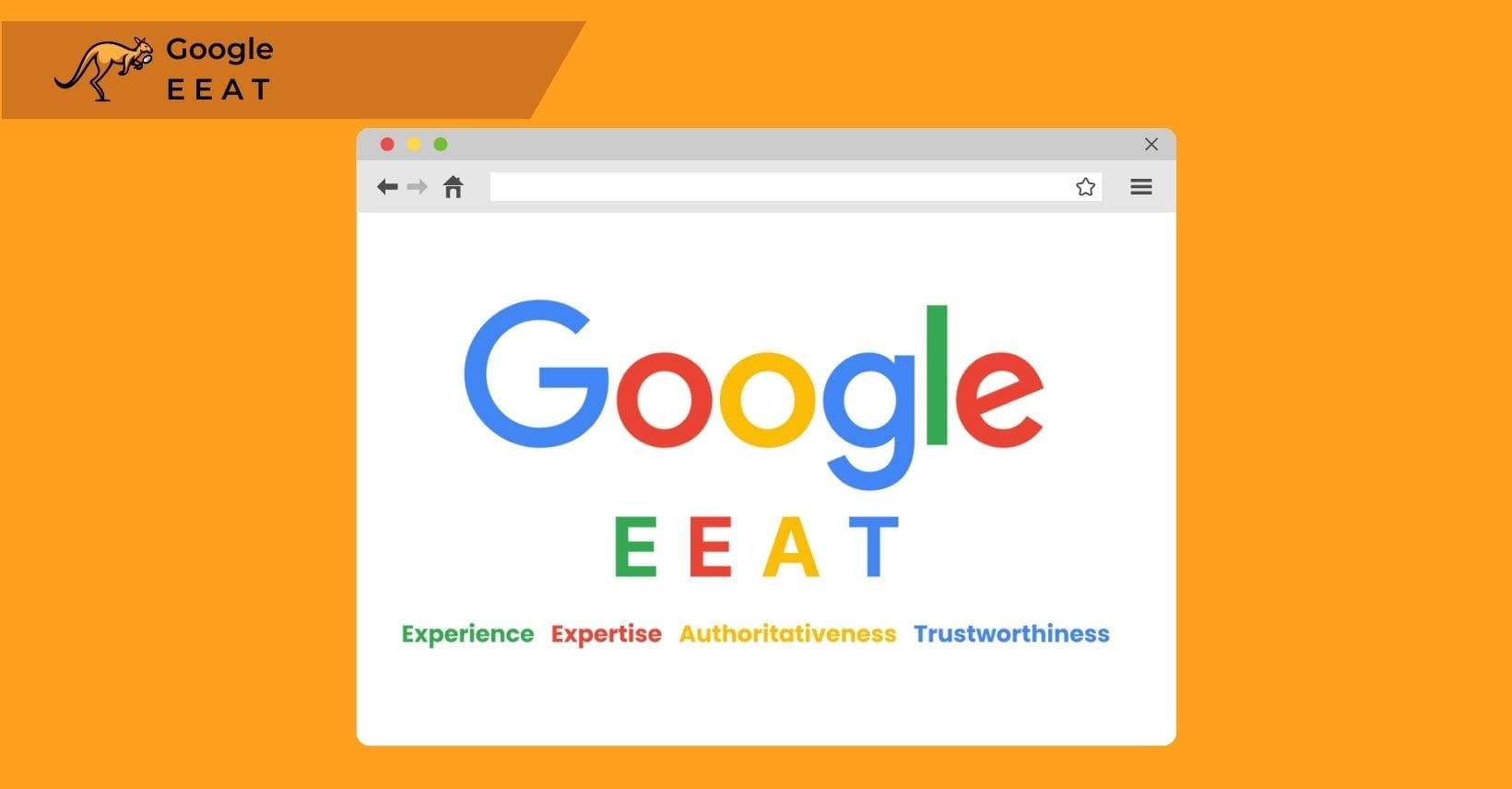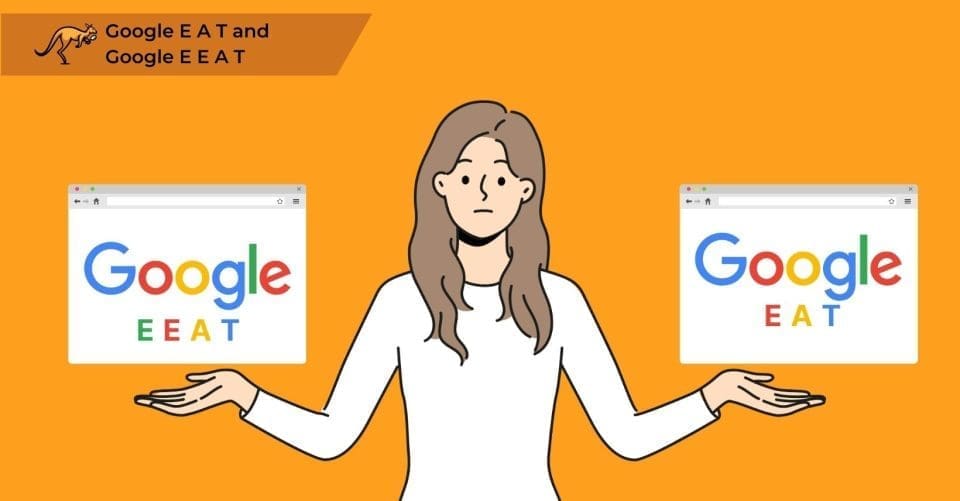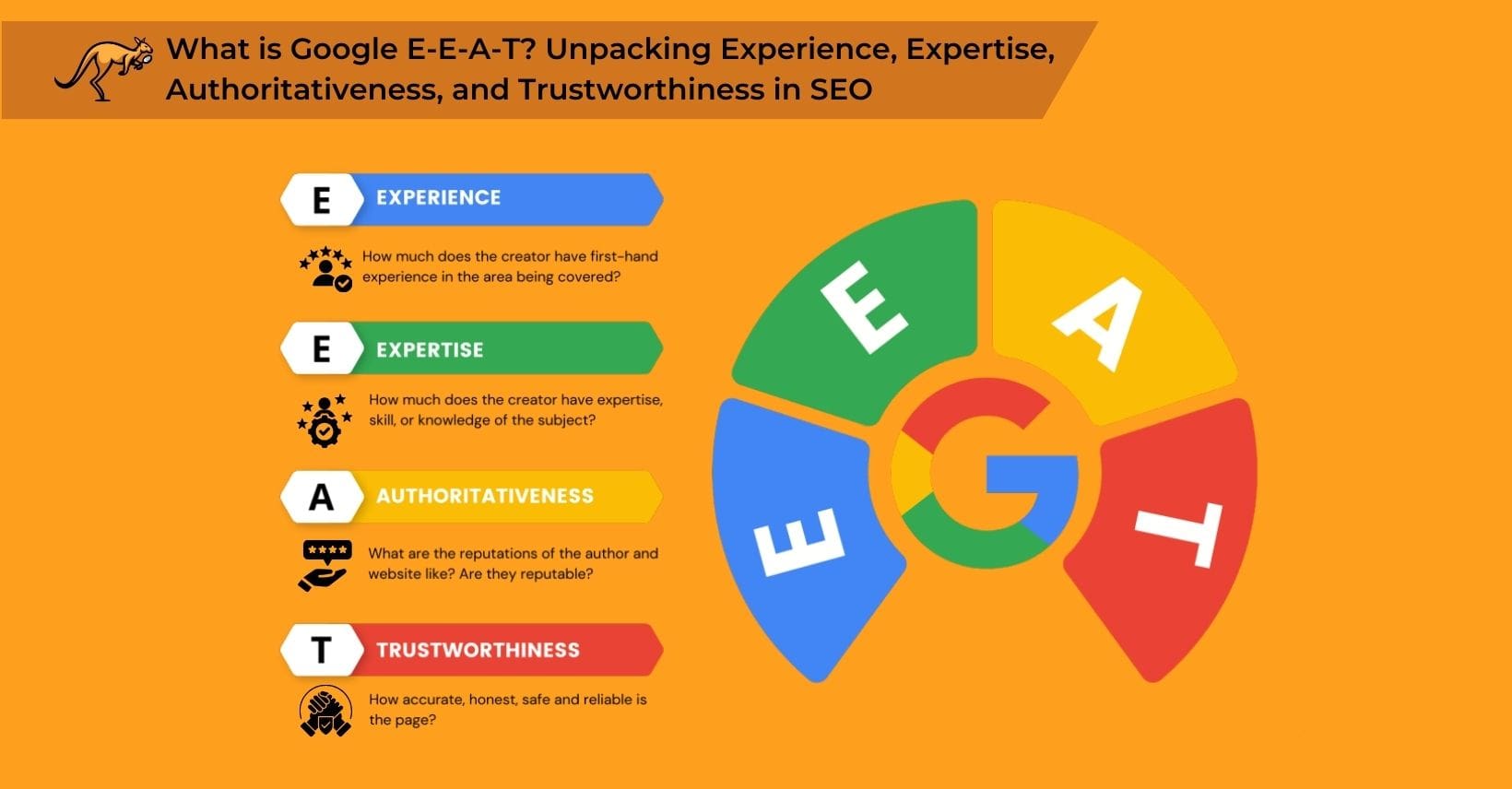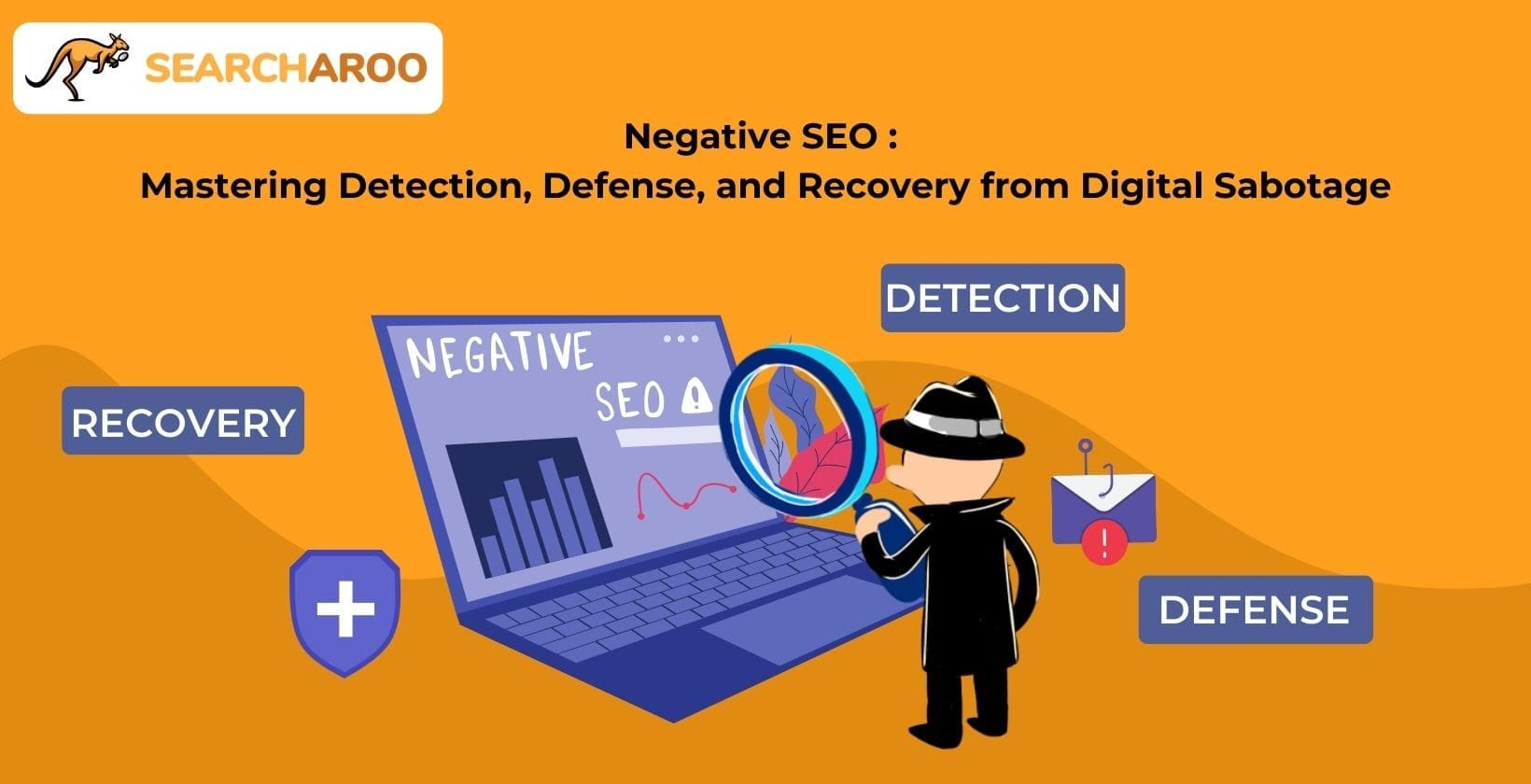Unless you are completely new to the search engine optimization business, you have probably heard of Google E E A T.
Even though the concept has been present since 2014, it has slowly yet surely become one of the most important aspects of SEO.
You are in for a surprise if you are used to Google’s E-A-T standards. Since the original introduction of E A T, Google has surprised the SEO community by adding a new “E”—for Experience.
But what does the new “E” in E-E-A-T signify for SEO in the future, and is this something we should have expected for a while?
Let’s look at the latest modification to Google’s Quality Rater Guidelines and how you can ensure you are doing everything you can to demonstrate “Experience” in your website content.
Below, you will find an introduction to the E E A T concept and a guide to how Google uses these criteria to identify the highest-quality authoritative websites.
We will also explain how to ensure that your website meets these criteria, helping you to rise up the Google search rankings.
What does Google E E A T stand for?

Google E-E-A-T stands for Experience, Expertise, Authoritativeness, and Trustworthiness, which forms a fundamental component in Google’s Search Quality Rater Guidelines that evaluators use to assess the quality of search results.
These people who assess search results are known as Search Quality Raters.
They are an important part of Google’s search management, and their feedback helps Google determine the success of algorithm improvements.
Google E-E-A-T represents a framework in SEO that guides content quality assessment, which Google uses to determine whether pages deserve high rankings. Though not a direct ranking factor, Google E-E-A-T serves as an important concept that every digital content marketer needs to understand for creating content that aligns with Google’s quality standards.
As you might expect, page quality has a huge impact on a page’s ranking in Google organic search results.
According to Google’s standards, the five most essential criteria utilized by their staff to assess the overall quality of a web page are:
- Experience, expertise, authority, and trust (E E A T)
- The Page’s Purpose (Is there a helpful purpose to this page?)
- Main Content Quality and Quantity
- Information about the website or the Main Content Creator
- Reputation of the website or the Main Content Author
So, in theory, the more a webpage exhibits experience, expertise, authority, and trustworthiness, the higher it should be able to rank in Google’s SERPs.
However, keep in mind that these indications are very subjective. You might be an expert in one field but need adequate expertise or relevant qualifications in another.
You may be an authoritative financial advisor, but you have no expertise or authority in writing recipes for a cooking website. Any tax form downloads provided on your cooking website will be out of place and of no use to anyone.
Nobody will trust a restaurant review written by someone who knows nothing about food, even if they have plenty of life experience in another area!
Similarly, even if you have done your taxes a lot, you may be an expert on an appropriate level when giving financial advice.
You can write a product review of tax management software but can’t give authoritative advice.
Having a low E E A T indicates that you do not have a positive reputation in your field, while a high E E A T indicates credible sources and authoritative sites, which Google values.
Finally, each piece of information needs a different E E A T balance. Still, the most important indicator is trust, which applies to any material, whether online stores, a Wikipedia page, a product review, YouTube videos, or a food blog post.
Look at these indirect ranking factors from the quality rater guidelines and see how each works.
Experience
Is the content writer a first-hand or real-world expert on the subject? Do they have relevant life experience? Have they tried the goods or services, for example, if they submit a review? Have they cooked the dish before they published the recipe? Experience can even include certain YMYL subjects (more on those later).
Consider a disaster survivor with personal experience offering advice on how to stay safe in a crisis. Experience, on average, is an easier bar to clear than expertise or authority.
Expertise
You should have substantial real-world experience or formal education to be considered an expert. However, you are a self-taught professional chef who has been cooking in high-end kitchens for years. In that case, you may be considered an expert.
Alternatively, expertise could mean holding a high-level academic qualification in your field, like a PhD. However, being seen as an authoritative or trustworthy source requires more than knowledge.
Authoritativeness
Authoritativeness is the next level up from Expertise. You may have real-world experience and formal training, but are others referring to you as the go-to expert on a subject?
To pass this hurdle, you must first establish a reputation for excellence. Do you train, certify, or inform industry experts? Do other professionals look to you for advice?
Authoritative sources have the best reputation in their field, written by a respected content creator who can be relied upon to provide high-quality content. That means a track record of Experience and Expertise, not just casual social media posts.
Trustworthiness
Google is seeking to quantify trust by analyzing a piece of content’s experience, competence, and authority.
It is the sum of the first three categories in E E A T and the thing you should always aim for when creating content.
Google values websites that can be trusted, providing credible sources and high-quality pages, not just a social media post or some web pages full of poorly sourced information.
Trusted, credible websites are essential for maintaining the integrity of the internet. These sites uphold standards that ensure reliable information, contributing to a healthier online environment. This commitment to credibility directly relates to understanding Google’s guidelines, leading us to explore the distinctions between Google E-A-T and Google E-E-A-T.
What’s the Difference Between Google E A T and Google E E A T?

Google E-E-A-T differs from the previous E-A-T concept by adding an extra “E” for Experience to the original framework of Expertise, Authoritativeness, and Trustworthiness, which Google implemented to emphasize the value of first-hand knowledge in content creation.
As one might expect, the focus is on the quality of content. Recently, Google appears to have been focused on ensuring that content posted online is as high-quality as possible, which is not unexpected given the current worry about low-quality, AI-generated material possibly flooding the web with the introduction of unreliable, poor-quality tools like ChatGPT.
It is vital to remember that these standards have no direct impact on search rankings because they are meant for human reviewers rather than machines.
However, they provide a clearer understanding of what Google emphasizes when evaluating website content.
E E A T is crucial for engaging human readers and reviewers, the true target audience of any web content. Catering solely to algorithms overlooks the actual end users. Understanding the importance of E E A T for your audience naturally leads us to explore why E E A T matters to Google.
Why Does E E A T Matter to Google?
Google uses E E A T to guarantee that it offers searchers accurate, true, safe, and valuable information. Anyone can make a website and put anything they want on it.
You do not have to be a doctor or have a finance degree to create a medical information website or write about investments.
This is a positive thing in certain ways. However, it does pose an issue for Google. People make key decisions that rely on what they find in search query results.
As a result, Google strives to guarantee that such judgments are based on the most reliable information available. And that is where E E A T comes in.
Google uses E E A T as a metric to ensure that website pages full of useful information written by people who genuinely know what they are talking about rank higher than perfectly SEO-optimized but inaccurate garbage churned out by generative AI in an unethical attempt to get clicks.
While not flawless, the E-A-T framework significantly enhances web safety and usability. This system provides a foundation for assessing content quality, an important element as we explore the Google Search Quality Rater Guidelines in our next discussion.
What are the Google Search Quality Rater Guidelines?
Google’s Search Quality Rater Guidelines directly incorporate E-E-A-T principles as central evaluation criteria, which human quality raters use to manually assess webpage quality and provide feedback that helps Google refine its algorithms to better identify high-quality content.
These search quality guidelines form a handbook for the team of quality raters to use, but SEO professionals can also use them to help guide their SEO efforts.
Anyone may view Google’s quality rater guidelines, often called search quality evaluator guidelines. Google adjusts the language in this document many times a year.
As the name implies, the search quality rater guidelines are the guidelines that Google’s professional quality raters must follow when doing their duties and identifying high-quality content with a high level of expertise, authoritativeness, and trustworthiness.
The rules in the search quality rater guidelines document explain the situations and components that must be evaluated and how an individual ought to rate the site being evaluated.
This text contains several sections discussing Expertise, Authority, and Trustworthiness.
For SEO professionals, understanding E-A-T—Expertise, Authoritativeness, and Trustworthiness—is crucial as Google emphasizes these factors in evaluating website quality. This understanding naturally leads to exploring YMYL—Your Money or Your Life—highlighting websites that could significantly impact users’ financial stability or health.
What Is Y M Y L?
You may also have heard of YMYL content. YMYL stands for Your Money [or] Your Life and refers to topics of genuine life or death importance.
That covers current events and natural disasters, medical information, and other situations in which clear and accurate information could save a life.
Reliable information on purchasing prescription drugs, for example, is almost certainly a YMYL topic. Advice for financial stability is important but not enough to be full YMYL content.
The relationship between E-E-A-T and YMYL content is particularly critical because Google holds YMYL (Your Money Your Life) content to higher E-E-A-T standards, which ensures that information that could impact users’ health, financial stability, or safety comes from sources with demonstrable experience, expertise, authoritativeness, and trustworthiness.
Google will likely award a relatively high E E A T score for trustworthy information.
Google knows that what people read online may change their lives. As a result, a poor source of information in search results might have serious effects.
You must proceed with caution if your website pages or material fall within any of these YMYL categories. Make it very evident that someone wrote it of authority.
Adhering to the E-E-A-T guidelines enhances your content’s chances for better organic search engine rankings, especially in YMYL topics. This adherence leads us to question if E-E-A-T serves as a Google ranking factor.
Is E E A T a Google Ranking Factor?
E E A T is not an official, direct Google ranking factor regarding observable data. However, Google analyzes additional signals to evaluate competence, authority, and trust ranking considerations.
Google published a white paper titled “How Google Fights Disinformation” in February 2019, emphasizing the relevance of E E A T in its rankings. This is an essential topic.
Google measures E-E-A-T through multiple quantifiable signals rather than a single metric, which includes analyzing author credentials, content accuracy, website reputation, backlink quality, and user engagement patterns that collectively indicate the level of experience, expertise, authoritativeness, and trustworthiness.
While E E A T may not be used directly as a ranking metric, a website with a high E EAT will likely hit the most important ranking factors.
Although E-A-T (Expertise, Authoritativeness, Trustworthiness) isn’t measured directly by Google, the factors that influence it still impact other metrics that are directly measured. This relationship highlights the importance of understanding and enhancing E-A-T. Let’s explore strategies for demonstrating your E-A-T to Google.
How to Show Google Your E E A T
So, we know what E E A T is now, but how do you prove that E A T to Google?
Google assesses each E-E-A-T component using specific criteria: Experience through demonstration of first-hand knowledge and personal insights; Expertise through formal qualifications and depth of subject knowledge; Authoritativeness through industry recognition and quality backlinks; and Trustworthiness through accuracy, transparency, and consistent reputation across the web.
Any content creator needs to know this to ensure that their content meets Google’s aims regarding search intent, user-generated content, and reputation.
Google E E A T is not an optional bonus: you need a high level of experience, expertise, authoritativeness, and trustworthiness, and you need to show that high E E A T to Google as clearly as possible.
Let’s look at how to demonstrate this properly as part of your SEO strategy.
Demonstrating Experience
Consider lived experience, especially first-hand knowledge of the issue you are writing about. Experience is especially valuable in a digital world overwhelmed by low-quality pages of generative AI content.
AI can never demonstrate true experiences of anything. It can, at best, make assumptions about human experience, but the content it outputs will be generic and, at best, plagiarized from human material.
It is certainly no accident that Google announced the inclusion of “experience” in its search quality raters criteria for E E A T shortly after the debut of ChatGPT.
Experience is a key differentiation between human-written content and AI-generated content.
As part of your SEO strategy, you can demonstrate your human experience by clearly displaying the faces behind your website. This does not have to be difficult.
Consider creating a good About Us Page to showcase your team’s credentials and capabilities. That means bios for your whole team, not just minimal customer service information and a physical address.
Demonstrating Expertise
The level of knowledge displayed in your piece or by the writer is called expertise. According to the rater guidelines, an author’s competence or authority on a subject should count heavily toward proving expertise.
However, there is some evidence that an author’s authority as an individual does not matter to Google E E A T.
The website’s perceived expertise is more important to earning a high E E A T: an anonymous article on a reputable website seems to be worth quite a lot, even though the content creator has no identity or track record.
Building trust with your audience will lead to further positive engagements, which will suggest to Google’s search algorithm that your site is one to trust and rank well in Google search results.
Demonstrating Authoritativeness
The degree to which a content producer is acknowledged as a go-to authority is used to measure authoritativeness.
There are three primary techniques to display authority. These are creating a solid content architecture that covers all facets of a certain topic, obtaining backlinks from authoritative websites, and creating a digital profile as an authority on an issue.
Authority, expertise, and experience are all intertwined. With experience and expertise, you can be an authority on a subject!
Building topical authority is a sensible and effective way to improve your site’s position in the Google EEAT rankings, and it works in most situations.
Your content strategy should consider everything a potential buyer or site visitor needs to know to develop a position as an authority in your niche.
Create and define a plan for delivering material that clearly shows E E A T in every article.
Backlinks are still a sign of an authoritative site, even if they carry less weight than they used to. Suppose someone links to your site citing content you wrote. In that case, this indicates that you are trustworthy and authoritative within the field.
Earning high-quality backlinks from other sites that are reputable and regarded as authoritative will help reflect the trustworthiness of your site.
It is important to clarify that authority refers to subject authority linked to competence and experience rather than domain authority.
Demonstrating to Google who you are and what you do can establish your authority and expertise on a certain issue.
Your brand has the potential to become key to your EEAT authority. Remember, with E E A T, you are not trying to sell yourself to the Google algorithm as a content creator.
You are trying to convince real human reviewers that you are a valuable source of information.
Demonstrating Trustworthiness
The only real way a content creator or website owner can demonstrate their trustworthiness is by demonstrating the three other qualities: experience, expertise, and authoritativeness.
Trust is the final part of E E A T and is the sum of the first three qualities. Combining your experience, expertise, and authority shows Google that you can be trusted.
Summarizing the Impact of E-E-A-T on Search Quality and Ranking
In the evolving landscape of SEO, understanding and implementing Google’s E-E-A-T—Experience, Expertise, Authoritativeness, and Trustworthiness—is crucial for anyone involved in creating and managing digital content. By ensuring your website and its content exhibit these qualities, you enhance your visibility and ranking in search results and contribute to a more reliable and trustworthy internet. As we continue to see shifts in how content is evaluated, staying informed and adaptive to these changes will be key to success in digital marketing. Remember, the goal is to serve your audience with valuable content that resonates with their needs and expectations, establishing your site as a credible and authoritative source in your niche.





